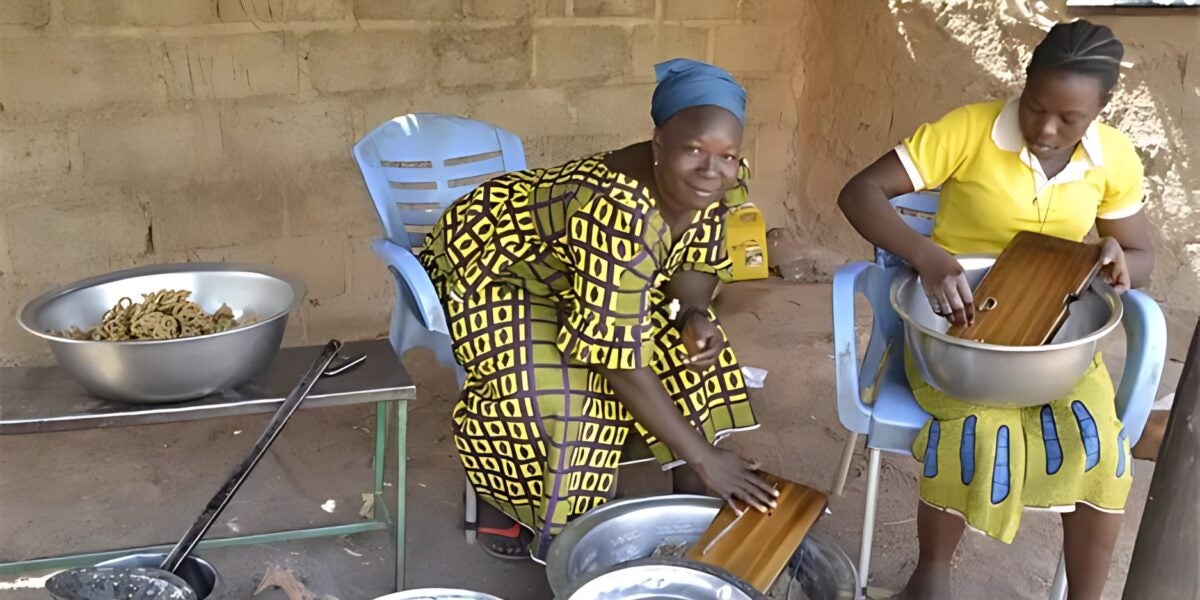
Lamoussa Dabilougou, a Burkina Faso entrepreneur, boosted profits by 75% after securing a loan through USAID CATALYZE’s capital injection intervention, demonstrating the impact of targeted investment in emerging markets.
In April 2023, USAID CATALYZE Finance for Resilience (F4R) recruited a Burkina-based microfinance institution, Réseau des Caisses Populaires du Burkina (RCPB), to implement a capital injection intervention for community savings groups (SGs) in Burkina Faso.
The capital injection invention is part of F4R’s blended finance approach to expand access to credit for underserved communities in Burkina Faso. By leveraging partnerships with financial institutions and financial facilitators, F4R supports micro, small and medium-sized enterprises (MSMEs) to access critical financing and mitigate the impacts of ongoing conflict in the region, which has intensified existing threats to food security and livelihoods.
To maximize the impact of capital mobilization, F4R employs a pay-for-results approach and incentivizes partners to focus their efforts on populations that are disproportionately impacted by conflicts and crises, including women and youth entrepreneurs, agro-dealers, and animal feed manufacturers.
RCPB and CATALYZE F4R collaborated to identify eligible SGs and assess their financial needs. Ultimately, 17 SGs in the Centre-Nord, Est, and Sahel regions of Burkina Faso received capital injections totaling $29,683 (XOF 18,210,500). Upon completion of the mandatory financial education, entrepreneurship, and Gender Action Learning Systems (GALS)* training, each SG received a loan ranging from $560 to $3,276 to distribute to their members to invest in their business.
A Personal Success Story
Thanks to the support of CATALYZE F4R, Lamoussa Dabilougou, a 45-year-old mother of four and artisanal peanut processor, received a XOF 200,000 (~$330), loan through the capital injection intervention. For two decades, Dabilougou has earned her livelihood by processing peanuts to make paste and “koura-koura” (crispy peanut biscuits that are popular throughout Burkina Faso) to sell at the local market.
Faced with economic hardship compounded by several years of increased food insecurity and inflation, Dabilougou joined forces with several other women in Centre-Nord’s Boulsa commune to establish the Kiswensida SG in 2022 to support each other’s income-generating activities and community life.
In 2023, the Kiswensida SG connected with an RCPB facilitator and was selected to participate in the intervention, ultimately receiving a capital injection totaling 1,600,000 (~ $2,600).
The group used the funds to grant their members additional loans for a four-month period at a reduced 4 percent interest rate; a one-month loan period extension; and a one percent decrease in interest rate from loans granted prior to the capital injection.
In order to fulfill the capital injection participation requirements, each Kiswensida SG member attended a detailed orientation, which included discussions on the importance of spousal participation in GALS training sessions, as well as financial education and entrepreneurship trainings. Since then, the members have conducted weekly meetings to discuss business, as well as collect members’ loan repayments and group savings contributions.
Despite the economic slowdown brought on by ongoing insecurity in Boulsa, Dabilougou is committed to securing a better future for her family. As a member of the Kiswensida SG, both she and her husband participated in the GALS training, gaining valuable expense planning and effective family communication skills.
“The GALS training has been valuable for our family because there is a better dialogue and mutual support between myself and my wife,” Dabilougou’s husband said. “We created a budget for our family’s expenses and consult each other on any unplanned expenses before making decisions. We really appreciate the training.” The trainings not only allowed Dabilougou to roughly double her regular savings per week but equipped her with valuable entrepreneurial skills that will enable her to adapt, manage, and grow her business successfully.
Prior to CATALYZE F4R and RCPB support, Dabilougou could only access an average loan amount of XOF 75,000 (~$125). Thanks to the loan she received through the capital injection intervention, Dabilougou received a loan of XOF 200,000 (~$330), enabling her to purchase and store approximately 1.2 tons of peanuts. The storage protected her peanut paste and “koura-koura” production from the impact of fluctuating raw material prices.
“[The loan] enable[ed] me to improve my profits,” she said in a recent interview. “I can make XOF 17,500 for each 100 kg bag of peanuts I process. Before the injection, I struggled to earn XOF 10,000.” Since receiving the loan, Dabilougou invests the additional profits into her small ruminant breeding business and saves it to build capital for her children’s future income-generating activities.
In the three months since receiving her loan, Dabilougou has processed one ton of peanuts, generating an estimated total profit of XOF 175,000 (~$3,154). Moreover, she has already repaid 25 percent of her loan before the deadline and aims to fully repay this first loan in order to secure a larger loan for further investment in her peanut processing business. The capital injection into the Kiswensida SG enabled Dabilougou’s business to not only survive but thrive.
*GALS is a community-led, empowerment methodology that uses a gender-inclusive approach to improve income, food and nutrition security of vulnerable people in a gender-equitable way.
